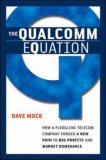Qualcomm Monday
lost its
longshot appeal to overturn the ITC ban on importing QCOM chips that infringe a Broadcom power saving patent. Basically the USTR said she wasn’t going to overturn a decision reached through the normal administrative process, no matter how big the impact.
There’s no way to spin this.
Qualcomm lost, it’s bad for Qualcomm, it’s bad for Qualcomm’s future market share, it’s bad for Qualcomm’s patent-based business model, and it’s bad for Qualcomm’s customers. Sure Qualcomm still
hopes to appeal the patent validity but that seems even less likely to succeed.
Qualcomm pulled out all the stops, commissioning bigshot economists (The Brattle Group) to say that
the ban will cost consumers billions. Now it will be interesting to see if that proves to be true (since both Brattle and Qualcomm will lose credibility if it doesn’t).
About the only good news for the home team is that (
after more than a year) Qualcomm
finally has a workaround to avoid infringing the patent.
Despite their huge win, it’s hard to believe much in the
Broadcom press release, which seems more about threatening Qualcomm’s shareholders and customers (to increase pressure for a settlement) than actually commenting on the legal ruling. Quoting General Counsel David A. Dull, the press release proclaims:
“According to the IEEE Spectrum, Broadcom possesses one of the world’s most powerful semiconductor patent portfolios,” Mr. Dull said.
Let’s see. Since when is a magazine article an authoritative source of how important is a company’s patent portfolio? “One of” could refer to top 20. Even if it was “top 1,” what proportion of the patents relate to mobile phones? And how does this relate to the relevance of Broadcom’s portfolio to Qualcomm’s products, or the relative importance of the Broadcom and Qualcomm 3G patent portfolios?
I could go on. Broadcom still thinks it will get $6/chip from Qualcomm until
patent 6,714,983 expires. Qualcomm obviously has no intention of paying — perhaps hoping to find some outside entity to put a reasonable value on the patent.
As best I can tell, the patent in question was invented by employees of Intermec Technologies of Cedar Rapids Iowa more than 12 years ago, and the patents were acquired by Broadcom as part of 150 patents
it bought for $24 million from Unova in 2002. (Apparently the
Wall Street Journal reported this in June,
as did the Seattle Times. It took me longer to write this paragraph than it took me with Google to identify the Cedar Rapids inventor of the patent as working for Intermec and tie those patents to the Broadcom/Unova deal). Buying patents makes Broadcom a savvy investor and a clever
patent troll, not an innovative company.
Still, Broadcom is winning under the current rules. Qualcomm was first sued by Broadcom in May 2005, and seems to have consistently underestimated the business consequences ever since. If I were a large institutional shareholder (or a customer like Verizon, Sprint or AT&T), I would ask what Qualcomm has been doing for the past two years. A smart lawyer, R&D manager (or CEO) would have ordered a full re-examination of all Qualcomm products to see if they might infringe any of the Broadcom patents claimed, to make sure that a work-around was forthcoming.
Six months ago, Qualcomm appointed a recently retired U.S. Attorney to be
VP and legal counsel. If she can’t change their luck, it would seem as though some more significant management change would be due.
Technorati Tags: 3G, Broadcom, patent infringement, Qualcomm


